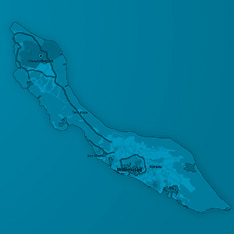Curaçao
Curaçao is a southern Caribbean island located off the Venezuelan coast. Curaçao is rich in history and is home to the colorful Willemstad, its capital city, which has been designated by UNESCO as a World Heritage Site. Since the colonial times Curaçao has been a center for trade and it shows in the beautiful buildings, which adorn Willemstad’s city center and outskirts.
Curaçao possesses relatively good quality infrastructure, including one of the busiest ports in the Caribbean and state of the art telecommunication networks.
Political Status
After the dissolution of the Netherlands Antilles on 10 October 2010, Curaçao obtained its autonomous status, making it next to The Netherlands, Aruba and St Maarten one of the four constituent countries of The Kingdom of The Netherlands. The citizens of all the constituent countries within the Kingdom share one nationality, which is Dutch.
As a self-governing country within the Kingdom, Curaçao is in principle responsible of its own internal affairs. The head of state is King Willem Alexander of the Netherlands, who is represented by the Governor of Curaçao, appointed to serve six-year terms. Legislation is enacted by a 21 member Staten (in Papiamento: Parlamento) together with the Government. Members of the Staten are elected by direct popular vote to serve four-year terms. The Government is formed by a nine-member cabinet, which is typically backed by a majority in the Staten.
Legal System
Curaçao is a civil law country, meaning that its laws are written (codified) into a referable system, which forms the primary source of law. The main source of private law is the Civil Code of Curaçao, which comprehensively deals with matters related to business, contracts and liability.
The legal jurisdiction lies with the Court of First Instance of Curaçao, the decisions of which may be appealed to the Joint Court of Justice of Aruba, Curaçao, St Maarten and of Bonaire, St Eustatius and Saba. Decisions of that Court may in turn be appealed to the Supreme Court of the Netherlands in The Hague.
Economy
Curaçao is considered the cradle of offshore financial services and today that sector still flourishes with corporations taking advantage of Curaçao’s legal, tax and e-commerce infrastructure. Having one of the busiest harbors in the Caribbean, including dry dock and bunkering facilities, the maritime industry plays a significant role in the island’s economy. Oil refining and transshipment have also been important for Curaçao since the 1920s. Furthermore, the island has two freezone’s, one at the Willemstad harbor and one at the airport. Tourism is also a major contributor to Curaçao’s economy.
